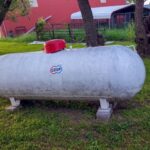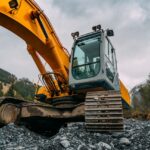Just like any vehicle, a vacuum trailer needs routine maintenance.
Inspect and change filters regularly. Air, fuel, and hydraulic filters help keep engines clean and running efficiently. Corrosion can quickly shorten the life of electrical connections, so use de-icing chemicals regularly to prevent rust.
Check the Tires
A trailer’s tires must support the rig’s weight and provide traction for safe driving. The tire pressure must be checked frequently and replaced as necessary.
Look for uneven tread wear, which may indicate an underinflated or overinflated tire. Also, check the tire for feathering and cupping, signs of improper wheel alignment, and suspension components.
If the brakes haven’t been serviced in a while, have a professional inspect your vac trailer to ensure it is entirely released at highway speeds and reduce the risk of jackknifing during an emergency stop. It’s a good idea to have the spare tire inspected as well.
Check the Electrical System
Most electric brake problems that cannot be corrected by adjusting the braking controller can be traced back to electrical system malfunction. A voltmeter or ammeter will allow you to check the system for proper operation.
Check the grounding wires. Many old trailers need a grounding wire from the breaker box to the chassis. You should always add one for safety. The least resistance is the path that electricity will take. It is better if it goes to the ground than to you or a loved one standing by the trailer.
Ensure the threshold voltage on the controller is at a manageable level. This can cause the brakes to feel grabby and harsh.
Check the Battery
Vac trailers are ideal for vacuum jobs that do not require the power and capacity of a truck-mounted machine. However, they do not exempt you from following safety codes.
Two batteries live in a silver box beside the power jack at the front of the trailer. They need regular checks to ensure they are in good condition and not corroded. Check the battery charge, voltage, and amperage every 30 days.
Check the Air Filter, Brakes, and Trailer Lights
The air filter helps keep the engine clean and running smoothly. It is essential to check it regularly and change it when needed.
It is crucial to ensure all the brake and tail lights are working. This will help you avoid expensive tickets and keep everyone safe on the road.
Check the Hydraulic Connections
This includes the hose connection on a vac system and any other hydraulic connections in the rig. Check and lubricate these areas regularly to prevent rust and corrosion.
A trailer-mounted vacuum excavation unit is a valuable tool for jobs that require precision and smaller-scale work. These units allow operators to work in tight spaces and reduce the need for extensive site restoration afterward.
Like any other equipment, trailer-mounted units must be maintained regularly. Operators should start by inspecting the tires to ensure proper tire wear. They should also grease the bearings regularly. The best time to do this is at the end of the day when the bearings are warm and more accepting of grease.
Also, they should check the water system daily to prevent issues—a hose-type pressure regulator before the water inlet and a check valve downstream.
Shut Down
Vac trailers can be an integral tool on many jobs requiring vacuum excavation power in a smaller package. Like other vehicles, they need regular maintenance to ensure proper operation.
Changing the hydraulic filters is an essential maintenance task that allows you to check and add fluid if necessary. It is also a good idea to drain the fluid tank and fill it with fresh fluid.
These simple tasks will help you get the most out of your vac truck. They may not be as involved as a full pre-job inspection, but they will keep you and your crew safe and the equipment running smoothly.









